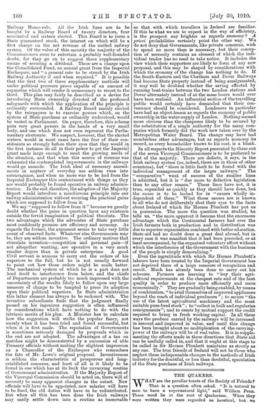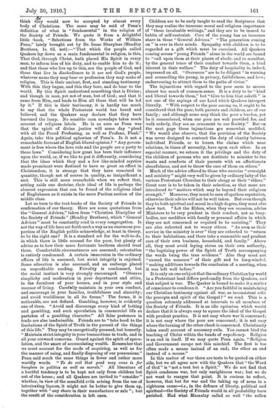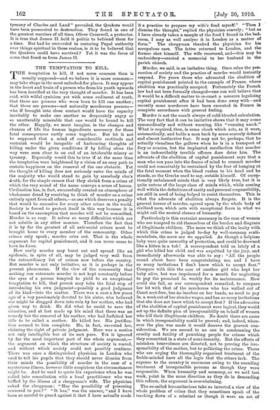THE QUAKERS.
AVHAT are the peculiar tenets of the Society of Friends P That is a question often asked. "It is natural to man to have a supernatural light," said William Penn. These word lie at the root of Quakerism. When they were written they were regarded as heretical, bat . we think itteey would now be accepted by almost every body of Christians. The same may be said of Penn's definition of what is " fundamental" in the religion of the Society of Friends. We quote it from a delightful little ?book, " Selections from the Works of William Penn," lately brought out by Dr. Isaac Sharpless (Headley Brothers, ls. 6d. net) :—" That which the people called Quakers lay down as a main fundamental in religion, is this, That God, through Christ, hath placed His Spirit in every man, to inform him of his duty, and to enable him to do it ; and that those who live up to this, are the people of God, and those that live in disobedience to it are not God's people, whatever name they may bear or profession they may make of religion. This is their ancient, first, and standing testimony. With this they began, and this they bore, and do bear to the world. By this Spirit understand something that is Divine; and though in man, yet not of man, but of God; and that it came from Him, and leads to Him all those that will be led by it." If this is their testimony, it is hardly too much to say that the whole Protestant world has heard and believed, and the Quakers may declare that they have leavened the lump. No sensible man nowadays takes much account of religious labels. He is as sure as Penn was that the spirit of divine justice will some day " plead with all the Proud Professing, as well as Profane, Flesh." Again, take this political aphorism of Penn's. Is it not a remarkable forecast of English liberal opinion P " Any govern- ment is free where the laws rule and the people are a party to those laws." Considering how great has been their influence upon the world, or, if we like to put it differently, considering that the ideas which they and a few like-minded mystics made prominent were destined to have so great an effect in Christendom, it is strange that they have remained in quantity, though not of course in quality, so insignificant a sect. This is still more remarkable when we reflect that, setting aside one doctrine, their ideal of life is perhaps the clearest expression that can be found of the religious ideal of Englishmen as it exists in the more Puritan section of the middle class.
Let us turn to the text-books of the Society of Friends in confirmation of our theory. Here are some quotations from the " General Advices," taken from " Christian Discipline of the Society of Friends " (Headley Brothers), which " General Advices " must be constantly read in every congregation. Is not the way of life here set forth such a way as an enormous pro- portion of the English public acknowledge, at least in theory, to be the right one P It is a standard set for the well-to-do, in which there is little counsel for the poor, but plenty of advice as to how their more fortunate brethren should treat them. Comfortable circumstances are assumed; ostentation is entirely condemned. A certain immersion in the ordinary affairs of life is assumed, but strict integrity is enjoined. Some education is also assumed, and an embargo placed on unprofitable reading. Frivolity is condemned, but the social instinct is very strongly encouraged. "Observe simplicity and moderation in your deportment and attire, in the furniture of your houses, and in your style and manner of living. Carefully maintain in your own conduct, and encourage in your families, truthfulness and sincerity; and avoid worldliness in all its forms." The forms, it is noticeable, are not defined. Gambling, however, is evidently one of them. "Avoid and discourage every kind of betting and gambling, and such speculation in commercial life as partakes of a gambling character." All false pretences in trade are also inadmissible. Friends are to "take heed to the limitations of the Spirit of Truth in the pursuit of the things of this life." They may be energetically pursued, but honestly.
Maintain strict integrity in your transactions in trade, and in all your outward concerns. Guard against the spirit of specu- lation, and the snare of accumulating wealth. Remember that we must account for the mode of acquiring, as well as for the manner of using, and finally disposing of our possessions."
Penn said much the same things in fewer and rather more worldly words. " To do evil that good may come is for bunglers in politics as well as morals." All literature of a hurtful tendency is to be kept not only from children but out of the house ; and all Quakers are invited to " consider " whether, in view of the manifold evils arising from the use of intoxicating liquors, it might not be better to give them up, together. with "any share in their manufacture or sale "; but the /vault of the consideration is left open. Children are to be early taught to read the Scriptures that they may realise the immense moral and religious importance of " these invaluable writings," and they are to be inured to habits of self-restraint. Care of the young has an immense share in these " General Advices." " The generation coming on " is ever in their minds. Sympathy with children is to be regarded as a gift which must be exercised. All Quakers coming across "young Friends" alone in the world are bound to "call upon them at their places of abode, and to manifest, by the general tenor of their conduct towards them, a kind interest in their welfare." The duty of hospitality is, indeed, impressed on all. " Overseers " are to be diligent " in warning and counselling the young, in privacy, faithfulness, and love ; endeavouring to attract them to the paths of virtue."
The injunctions with regard to the poor seem to savour almost too much of common-sense. It is a duty to be " kind and liberal towards them," but "Give to him that asketh " is not one of the sayings of our Lord which Quakers interpret literally. " With respect to the poor among us, it ought to be considered that the poor, both parents and children, are of our family ; and although some may think the poor a burden, yet be it remembered, when our poor are well provided for, and walk orderly, they are an ornament to our Society." But on the next page these injunctions are somewhat modified. " We would also observe, that the provision of the Society was never designed to contract the duty of charity between individual Friends, or to lessen the claims which near relations, in times of necessity, have upon each other. In an especial manner, we esteem it the privilege and the duty of the children of persons who are destitute to minister to the wants and comforts of their parents with an affectionate cheerfulness, and not to throw the care of them on others."
Much of the advice offered to those who exercise "oversight and ministry " might very well be given by ordinary-laity of the various Protestant Churches to their clergy or their " elders." Great care is to be taken in their selection, so that none are introduced to " matters which may be beyond their religious strength." Moreover, they must be men of spotless reputation, otherwise their advice will not be well taken. But even though they be both spiritual and moral in a high degree, they must also show tact. "Let the Elders, when they see occasion, advise Ministers to be very prudent in their conduct, not as busy- bodies, nor meddlers with family or personal affairs in which they are not concerned or required to be assisting." They are also exhorted not to weary others. "As soon as their service in the ministry is over" they are exhorted to "return to their habitations, and there take a reasonable and prudent care of their own business, household, and family." Above all, they must avoid laying stress on their own authority, "the baptizing power of the Spirit of Truth accompanying the words being the true evidence." Also they must not " exceed the measure " of their gift and be lon g-winded, " making additions towards the conclusion of a meeting, when it was left well before."
It is only on one subject that the ordinary Christian lay world in a Protestant land differs profoundly from the Quakers, and that subject is war. The Quaker is bound to make it a matter of conscience to condemn it. "Are you faithful in maintaining our Christian testimony against all war, as inconsistent with the precepts and spirit of the Gospel ? " we read. This is a question solemnly addressed at intervals to all members of the Society of Friends. It is an idle optimism which would declare that it is always easy to square the ideal of the Gospel with prudent practice. It is not easy where war is concerned ; it is not easy where the poor are concerned ; it is not easy where the turning of the other cheek is concerned. Christianity takes small account of necessary evils. You cannot bind the teaching of Christ within the bands of expediency. Religion is an end in itself. If we may quote Penn again, "Religion and Government escape not this mischief. The first is too often made a means instead of an end; the other an end instead of a means."
In this matter of war there are texts to be quoted on either side, but we all agree now with the Quakers that "the Word of God" is "not a text but a Spirit." We do not find that Spirit condemns war, but only unrighteous war; but we do not want to reargue that point. It is curious to reflect, however, that but for war and the taking up of arms in a righteous cause—i.e., in the defence of liberty, political and spiritual—the Society of Friends would in all probability have perished. Had what Macaulay called so well " the sullen tyranny of Charles and Laud" prevailed, the Quakers would have been persecuted to destruction. They found in one of the greatest warriors of all time, Oliver Cromwell, a protector. It is true that James II. held it politic to befriend them for a time. But had ho succeeded in restoring Papal authority over things spiritual in these realms, is it to be believed that the Quakers could have survived P Yet it was the force of arms that freed us from James IL








































 Previous page
Previous page